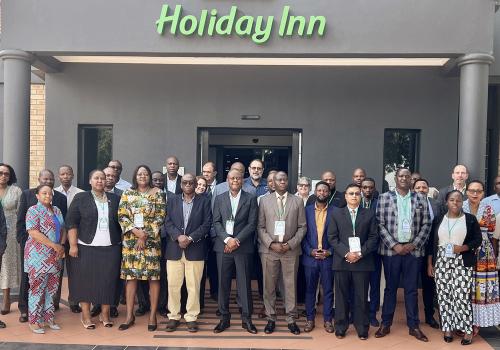The Southern African Development Community (SADC) region faces challenges in wildlife conservation, such as habitat destruction, climate change impacts, corruption, pollution, overexploitation through hunting and fishing, as well as the threats of illegal wildlife trade and poaching. SADC Member States expressed these concerns during the Law Enforcement and Anti-Poaching (LEAP) stakeholder’s workshop in Johannesburg, South Africa, held from 9th – 11th December 2024.
The workshop aimed to enhance capacity and review the implementation of the LEAP strategy in SADC Member States. The fight against wildlife crime goes beyond environmental and conservation and it is critical to the contribution of peace, security, and socio-economic development of the region.
Through regional efforts to operationalise the Revised LEAP Strategy (2022–2032), the region is proactively focused on directly combatting transnational wildlife crime, safeguarding biodiversity, and promoting the sustainable utilisation of natural resources.
Mr Arthur Musakwa, the Director of Operations at the Parks and Wildlife Management Authority of the Republic of Zimbabwe and Chairperson of the LEAP Stakeholders Workshop, commended the dedication by Member States in their participation and willingness to share their expertise, experiences, and knowledge to advance the collective vision for conservation and development in the SADC region, aiming to eliminate wildlife crime and achieve sustainability for the benefit of the people.
The Chairperson acknowledged the contributions and assistance from both regional and international partners, emphasising the vital technical collaboration that has enhanced institutional capacities and ensured the enduring success of the LEAP Strategy implementation.
Mr. Musakwa highlighted that the workshop underscores the pivotal role that engaged technical expertise and partners play in shaping governmental policies and regulations, along with the advancement of wildlife conservation and law enforcement strategies throughout the region.
He emphasised the necessity of prioritising the implementation and enforcement of legislations and policies such as the SADC Law Enforcement and Anti-Poaching (LEAP) Strategy (2022 - 2032), highlighting it as a fundamental aspect of regional endeavors in combating cross-border wildlife crimes and a reflection of the shared dedication to preserving wildlife heritage, strengthening law enforcement capacities, and promoting regional cooperation.
Mr. Domingos Gove, the SADC Director of Food Agriculture and Natural Resources, highlighted the importance of implementing the LEAP Strategy. He emphasised its alignment with the foundational pillars of Peace and Security, which is integral to the SADC Regional Indicative Strategic Development Plan (RISDP) 2020-2030.
The comprehensive approach of the LEAP Strategy aims to address transnational wildlife crime, enhance regional stability and governance, facilitate trade and investment, and support sustainable wildlife economies. He mentioned that this strategic framework also seeks to advance social and human development, minimise human-wildlife conflicts, and enhance livelihoods and resilience.
In the context of enhancing programmes and activities supporting the LEAP, he emphasised the importance of utilising established platforms such as the SADC Transfrontier Conservation Areas (TFCA) Network for cross-border conservation and law enforcement initiatives, along with the SADC International Cooperating Partners (ICP) Thematic Groups to ensure alignment with donor priorities and mobilising resources.
The workshop exemplifies SADC Member States' dedication to combatting wildlife crime and signifies the unity among Member States, stakeholders and partners in advancing regional initiatives and global support systems. Through a unified approach, the region capitalises on expertise, enhancing institutional capacities, and ensuring the sustainable success of the LEAP Strategy.
Moreover, the workshop was designed to introduce an opportunity to explore new avenues for cooperation, resource mobilisation and technical support to efficiently combat wildlife crime.
Some of the expected outcomes of this workshop include:
The establishment of the Technical Implementation Group (TIG): A critical structure that will enhance regional coordination and ensure effective monitoring of the LEAP Strategy.
Strengthened understanding of the linkages between corruption and wildlife crime: This is a key area requiring targeted interventions, and I am confident that today’s discussions will offer innovative solutions.
Insights from Member States on LEAP implementation progress: These presentations will provide a comprehensive picture of the achievements and challenges across the region, informing the way forward.
Enhanced alignment with partners’ projects and programmes: Through the presentations by UNODC, GIZ, USAID, and others, we aim to identify actionable synergies that support the LEAP Strategy’s implementation, leveraging existing initiatives to optimize impact.
The workshop also delivered presentations focusing on the intersection of corruption and wildlife crimes and explored actionable solutions. Corruption was highlighted as a significant challenge impacting the wildlife sector and that through organisational development, system strengthening, and intelligence unit empowerment such incidents could be limited.
Stakeholders and Member States shared insights on accomplishments, obstacles, and key takeaways crucial for shaping collaborative regional strategies. The workshop offered a platform to review collective advancements within SADC and strategise for optimised implementation with backing from the United Nations Office on Drugs and Crime (UNODC), United States Agency for International Development (USAID), and Deutsche Gesellschaft für Internationale Zusammenarbeit (GIZ) under the Global Partnership Programme.
Moreover, the workshop established the Technical Implementation Group (TIG) to tackle both LEAP components and Human-Wildlife Conflict (HWC). The TIG will serve as a vital mechanism in ensuring efficient coordination and providing technical guidance for executing the strategy.

